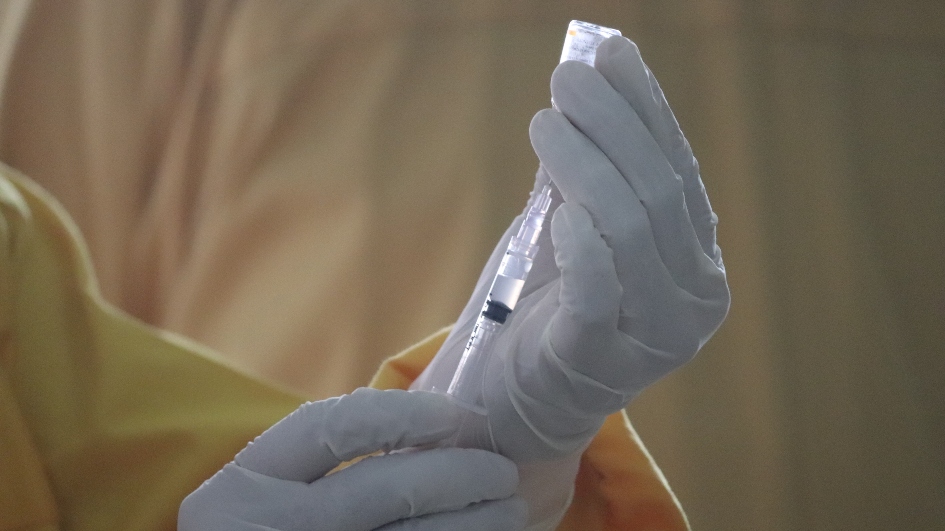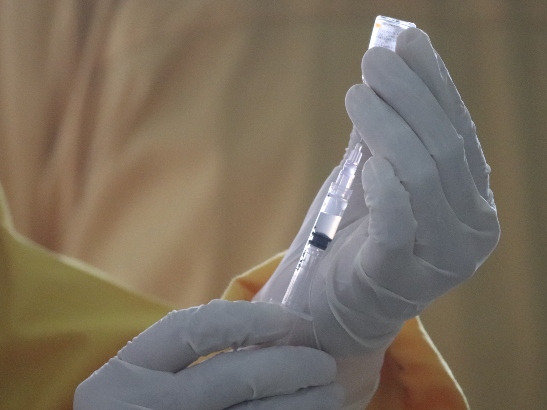
Image: Person filling a syringe with Covid-19 vaccine. Credit: Mufid Majnun via Unsplash
A single dose of a Covid-19 vaccine triggers an immune response in around 70 per cent of patients with myeloma – suggesting that it does provide protection against the virus.
Researchers tested for Covid-19 coronavirus antibodies in 93 people with the blood and bone marrow cancer, myeloma. A recent report with a smaller number of patients with myeloma suggested that blood cancer patients might receive limited protection after vaccination.
The study, led by The Institute of Cancer Research, London, and The Royal Marsden NHS Foundation Trust, aimed to find out whether vaccine protocols needed to change for this group of cancer patients.
Myeloma is a cancer of the immune cells produced in the bone marrow. The disease puts patients at greater risk of severe Covid-19 infection and there were concerns that it could also cause them to have less protection in response to any vaccine.
Immune responses in 70 per cent of patients
The researchers tested the blood of patients who had received a first dose of vaccine, looking for SARS-CoV-2 immunoglobulin G (IgG) antibodies, an indicator of whether an individual has developed some immunity to Covid-19. They found that 56 per cent of the myeloma patients (52 of 93) tested positive for the coronavirus IgG antibodies.
When the researchers further analysed the blood of 40 of the patients who tested negative to see if they had other types of antibody indicating some immune protection against Covid-19, they found an additional 13 patients had some anti-SARS-CoV-2 antibodies. Around 70 per cent of the patients with myeloma tested therefore had an immune response to the vaccine.
The research is published in the journal The Lancet Haematology today and was carried out by clinical academics at The ICR and The Royal Marsden.
Good responses to both vaccines
The patients in the study had either received the AstraZeneca or Pfizer vaccine and been given a first dose at least three weeks prior to their antibody blood test.
There was no significant difference in the percentage of patients with a positive antibody result between those who received the Pfizer (26/48, 54 per cent) and AstraZeneca (26/45, 58 per cent) vaccines. This result supports the current guidance for people with myeloma to accept whichever vaccine is offered to them.
The researchers found that a patient’s age, sex, white blood cell level, or time since vaccination, had no impact on their immunity to the virus. They found the most striking difference between people with myeloma was based on how they were responding to cancer treatment – 66 per cent of those responding well to treatment showed immunity compared with only 30 per cent of patients responding poorly to treatment.
Findings should provide reassurance
The study was a real-world retrospective assessment involving patients under the care of The Royal Marsden. The researchers stress that the results do not tell us for certain that the vaccines protect patients with myeloma against Covid-19 but they have been able to use the information to provide some reassurance to patients who were concerned that vaccines would not work at all.
The researchers found an association between poor immune response to the vaccine and patients being immunosuppressed or being on treatment at the time of vaccination.
However, given that pausing of treatment carries its own risk of a patient’s myeloma progressing, the authors say that decisions around the possible pausing of treatment should be made on an individual basis. Patients should discuss their treatment with their own haematologist who will balance the risks and benefits.
Second dose may improve response further
The immune response might improve after a second dose of the vaccine and the ICR and Royal Marsden clinicians are continuing to test antibody status after patients have had a second jab. The researchers believe that it is important to identify and track people with myeloma who are not responding to the vaccine because they may be left vulnerable to severe Covid-19 infection – and might want to take additional precautions to reduce their risk.
The work was supported by the NIHR Biomedical Research Centre at The Royal Marsden and the ICR, and authors receive funding from Cancer Research UK, The Royal Marsden Cancer Charity and the Wellcome Trust.
Reassuring as society unlocks
Study co-leader Dr Kevin Boyd, Consultant Haematologist at The Royal Marsden NHS Foundation Trust and Leader of the Myeloma Diagnostics and Novel Treatments team at The Institute of Cancer Research, London, said:
“Patients living with myeloma have had a difficult time during the coronavirus pandemic with long periods of enforced shielding. Because they are a vulnerable group, they were prioritised in the vaccination programme, along with many other patients with blood cancers. We know from talking to patients in clinic that they are worried about whether the vaccine will offer them good protection, as they know that patients such as themselves were not included in the original vaccine trials and they also know that their immune system can be weakened by this disease.
“This study is not reassuring for every patient, as we do see reduced vaccine response rates compared with the general population. However, overall the results are encouraging, showing that the majority of patients do respond to their first vaccine dose, and I expect this to improve following the second dose. As society begins to unlock, our patients wish to start seeing relatives and loved ones again and, like all of us, start to enjoy a more normal life. I hope this study provides some reassurance that this should be possible.”
Myeloma is a cancer of immune cells
Study co-leader Dr Charlotte Pawlyn, Leader of the Myeloma Biology and Therapeutics Team at The Institute of Cancer Research, London, and Consultant Haematologist at The Royal Marsden NHS Foundation Trust, said:
“Since myeloma is a cancer of the immune cells, we were worried patients with this blood cancer could have a poor response to the vaccine. These results are therefore very reassuring for people with myeloma and potentially other blood cancers who might be worried about whether the vaccine will work for them.
“Patients with myeloma did not appear to respond as well to the Covid-19 vaccine as the general public but the majority of patients had an immune response detected and are likely to be protected in some way. This is really important as UK restrictions begin to ease and the risk of infection increases again.
“Nevertheless we do need to monitor patients closely after vaccination to ensure the presence of antibodies translates to protection from infection, how long any protection lasts and to identify those who are less likely to be protected.”
Rapid real-world analysis
Professor Paul Workman, Chief Executive of The Institute of Cancer Research, London, said:
“The coronavirus pandemic has made living with cancer even more difficult as patients have been asked to shield and in many cases have had treatments delayed. It’s important that we do what we can to ensure that cancer patients are able to share in the hope that the vaccine programme is bringing and this means carrying out rapid real-world analysis to assess whether patients are being protected. These findings, showing that Covid-19 vaccines are likely to be effective in people with myeloma, are important and reassuring. They should help guide how vaccination is provided to patients in ways that minimise the impact on their cancer treatment.”
Professor David Cunningham, Director of Clinical Research at The Royal Marsden NHS Foundation Trust, said:
“Patients with cancer remain understandably anxious about receiving treatment during the Covid-19 pandemic and those with haematological malignancies are considered at greatest risk. This important research show that patients with myeloma will develop protection against Covid-19 from vaccination but in some groups this is likely to be incomplete. Research into optimisation of the vaccine strategy for these patients is a high priority and at The Royal Marsden we have a number of studies evaluating the immunological response to Covid-19 infections and vaccines.”
‘Optimistic and confident’
Royal Marsden patient Carl Scheib, 76, has been in remission for myeloma since spring 2018 after being diagnosed nine years ago. He has undergone two Stem Cell Transplants over the years and is taking part in a clinical trial. For the past year he has been visiting hospital monthly for blood tests and then having his maintenance medication delivered to his Surrey home the following day.
He said: “I was very pleased to be told that I have built up a positive antibody response after my first Pfizer vaccine. During my cancer treatment I have always had to be careful about not picking up bugs and infections as my immune system has been challenged but during the past year, I have been particularly cautious. I have been shielding at home with my wife and like most people, have found that living a very restricted life during lockdown has been difficult. The garden, which we are fortunate to have, has been a great outlet. However, I have really missed seeing my grandchildren and friends. I am now more optimistic and confident that after my second dose I will be able to spend quality time with my extended family sooner rather than later.
“I am very grateful to The Royal Marsden and the ICR for carrying out this research study to find out about immune response as there was some doubt regarding the antibody response following my cancer treatment. This is very promising for patients like me and I am extremely grateful.”
